Leadership Insights from Classic Social Psychology Studies Analysis
VerifiedAdded on 2023/04/23
|7
|1479
|409
Essay
AI Summary
This essay delves into classic social psychology studies, specifically analyzing Norman Triplett's competition studies and Richard LaPiere's hospitality study, to derive insights applicable to leadership contexts. Triplett's research highlights the impact of competition on performance, suggesting that leaders can foster motivation through competitive environments rather than individual targets, although this contradicts the transactional theory of leadership. LaPiere's study emphasizes the importance of attitudes in social psychology, particularly in understanding leader-subordinate relationships and organizational dynamics, challenging the contingency theory of leadership. The essay concludes that studying the attitudes of leaders can help identify management loopholes and improve overall organizational compatibility and effectiveness. Desklib provides access to similar solved assignments and study resources for students.
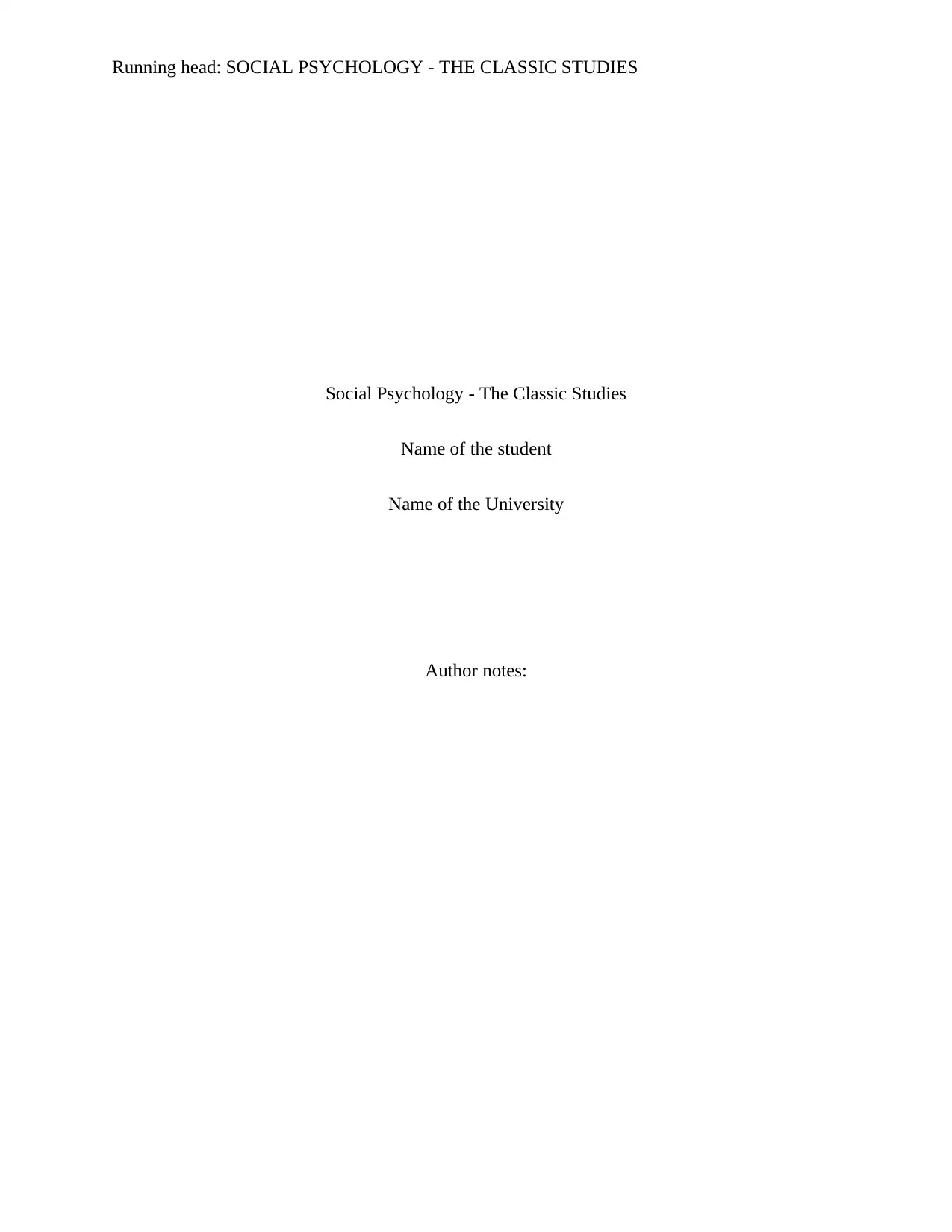
Running head: SOCIAL PSYCHOLOGY - THE CLASSIC STUDIES
Social Psychology - The Classic Studies
Name of the student
Name of the University
Author notes:
Social Psychology - The Classic Studies
Name of the student
Name of the University
Author notes:
Paraphrase This Document
Need a fresh take? Get an instant paraphrase of this document with our AI Paraphraser
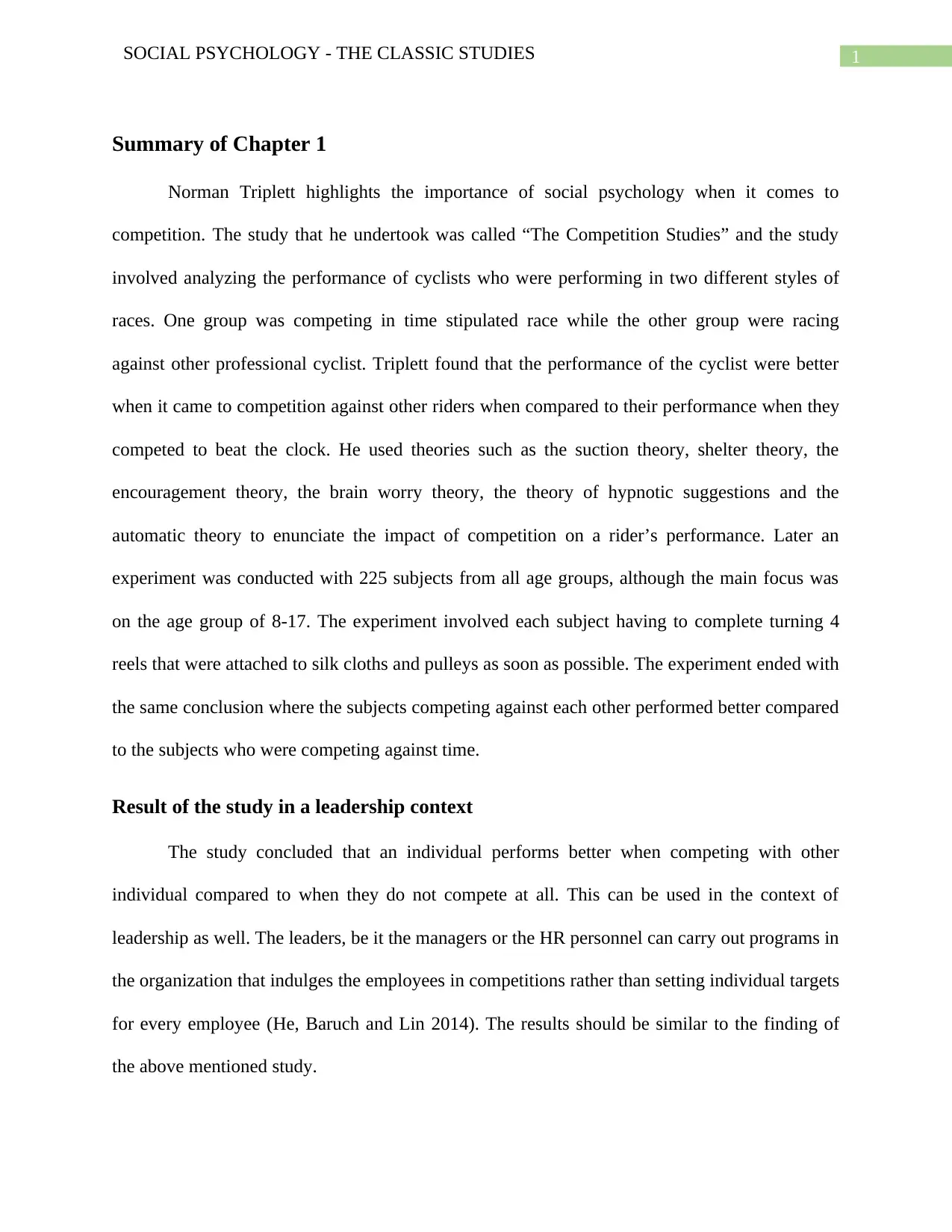
1SOCIAL PSYCHOLOGY - THE CLASSIC STUDIES
Summary of Chapter 1
Norman Triplett highlights the importance of social psychology when it comes to
competition. The study that he undertook was called “The Competition Studies” and the study
involved analyzing the performance of cyclists who were performing in two different styles of
races. One group was competing in time stipulated race while the other group were racing
against other professional cyclist. Triplett found that the performance of the cyclist were better
when it came to competition against other riders when compared to their performance when they
competed to beat the clock. He used theories such as the suction theory, shelter theory, the
encouragement theory, the brain worry theory, the theory of hypnotic suggestions and the
automatic theory to enunciate the impact of competition on a rider’s performance. Later an
experiment was conducted with 225 subjects from all age groups, although the main focus was
on the age group of 8-17. The experiment involved each subject having to complete turning 4
reels that were attached to silk cloths and pulleys as soon as possible. The experiment ended with
the same conclusion where the subjects competing against each other performed better compared
to the subjects who were competing against time.
Result of the study in a leadership context
The study concluded that an individual performs better when competing with other
individual compared to when they do not compete at all. This can be used in the context of
leadership as well. The leaders, be it the managers or the HR personnel can carry out programs in
the organization that indulges the employees in competitions rather than setting individual targets
for every employee (He, Baruch and Lin 2014). The results should be similar to the finding of
the above mentioned study.
Summary of Chapter 1
Norman Triplett highlights the importance of social psychology when it comes to
competition. The study that he undertook was called “The Competition Studies” and the study
involved analyzing the performance of cyclists who were performing in two different styles of
races. One group was competing in time stipulated race while the other group were racing
against other professional cyclist. Triplett found that the performance of the cyclist were better
when it came to competition against other riders when compared to their performance when they
competed to beat the clock. He used theories such as the suction theory, shelter theory, the
encouragement theory, the brain worry theory, the theory of hypnotic suggestions and the
automatic theory to enunciate the impact of competition on a rider’s performance. Later an
experiment was conducted with 225 subjects from all age groups, although the main focus was
on the age group of 8-17. The experiment involved each subject having to complete turning 4
reels that were attached to silk cloths and pulleys as soon as possible. The experiment ended with
the same conclusion where the subjects competing against each other performed better compared
to the subjects who were competing against time.
Result of the study in a leadership context
The study concluded that an individual performs better when competing with other
individual compared to when they do not compete at all. This can be used in the context of
leadership as well. The leaders, be it the managers or the HR personnel can carry out programs in
the organization that indulges the employees in competitions rather than setting individual targets
for every employee (He, Baruch and Lin 2014). The results should be similar to the finding of
the above mentioned study.
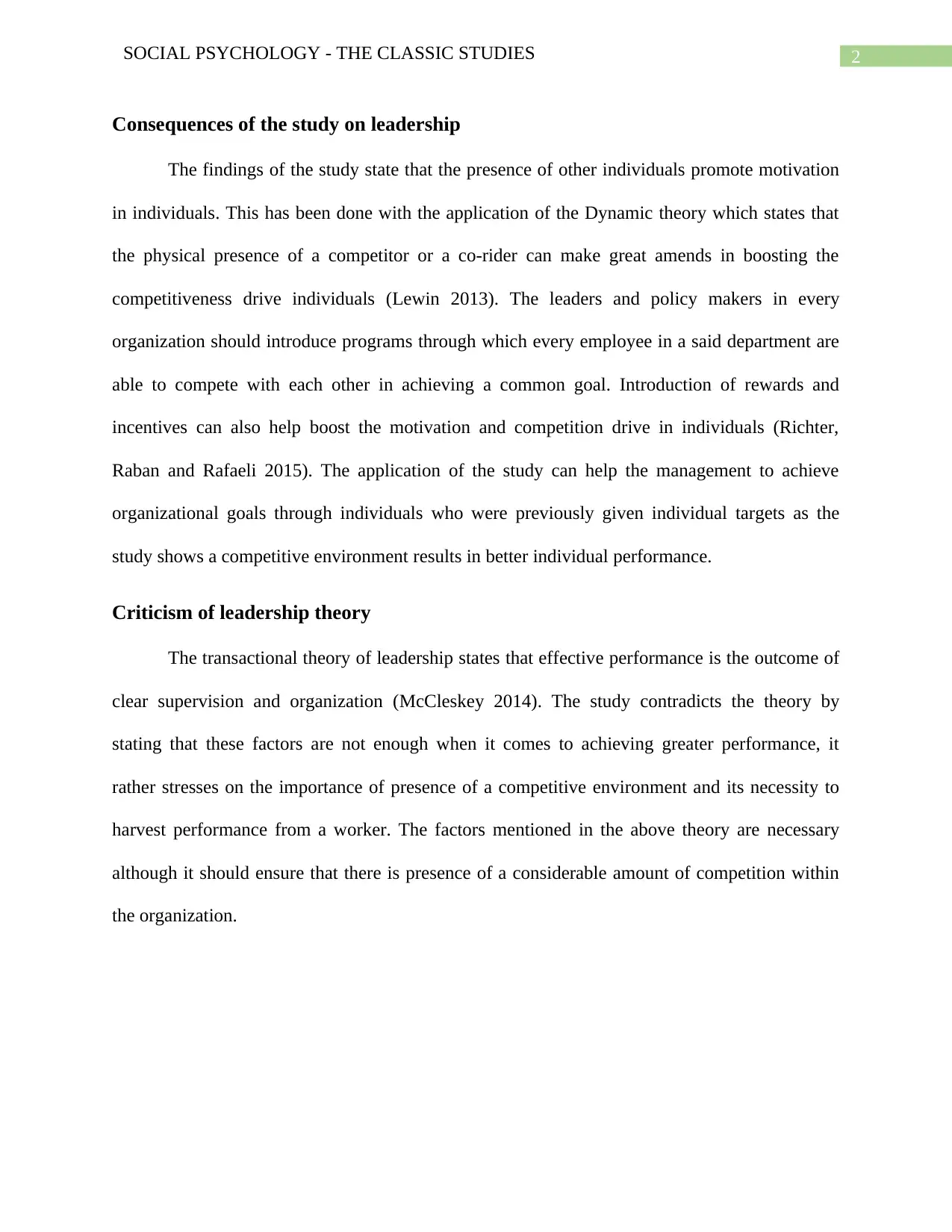
2SOCIAL PSYCHOLOGY - THE CLASSIC STUDIES
Consequences of the study on leadership
The findings of the study state that the presence of other individuals promote motivation
in individuals. This has been done with the application of the Dynamic theory which states that
the physical presence of a competitor or a co-rider can make great amends in boosting the
competitiveness drive individuals (Lewin 2013). The leaders and policy makers in every
organization should introduce programs through which every employee in a said department are
able to compete with each other in achieving a common goal. Introduction of rewards and
incentives can also help boost the motivation and competition drive in individuals (Richter,
Raban and Rafaeli 2015). The application of the study can help the management to achieve
organizational goals through individuals who were previously given individual targets as the
study shows a competitive environment results in better individual performance.
Criticism of leadership theory
The transactional theory of leadership states that effective performance is the outcome of
clear supervision and organization (McCleskey 2014). The study contradicts the theory by
stating that these factors are not enough when it comes to achieving greater performance, it
rather stresses on the importance of presence of a competitive environment and its necessity to
harvest performance from a worker. The factors mentioned in the above theory are necessary
although it should ensure that there is presence of a considerable amount of competition within
the organization.
Consequences of the study on leadership
The findings of the study state that the presence of other individuals promote motivation
in individuals. This has been done with the application of the Dynamic theory which states that
the physical presence of a competitor or a co-rider can make great amends in boosting the
competitiveness drive individuals (Lewin 2013). The leaders and policy makers in every
organization should introduce programs through which every employee in a said department are
able to compete with each other in achieving a common goal. Introduction of rewards and
incentives can also help boost the motivation and competition drive in individuals (Richter,
Raban and Rafaeli 2015). The application of the study can help the management to achieve
organizational goals through individuals who were previously given individual targets as the
study shows a competitive environment results in better individual performance.
Criticism of leadership theory
The transactional theory of leadership states that effective performance is the outcome of
clear supervision and organization (McCleskey 2014). The study contradicts the theory by
stating that these factors are not enough when it comes to achieving greater performance, it
rather stresses on the importance of presence of a competitive environment and its necessity to
harvest performance from a worker. The factors mentioned in the above theory are necessary
although it should ensure that there is presence of a considerable amount of competition within
the organization.
⊘ This is a preview!⊘
Do you want full access?
Subscribe today to unlock all pages.

Trusted by 1+ million students worldwide
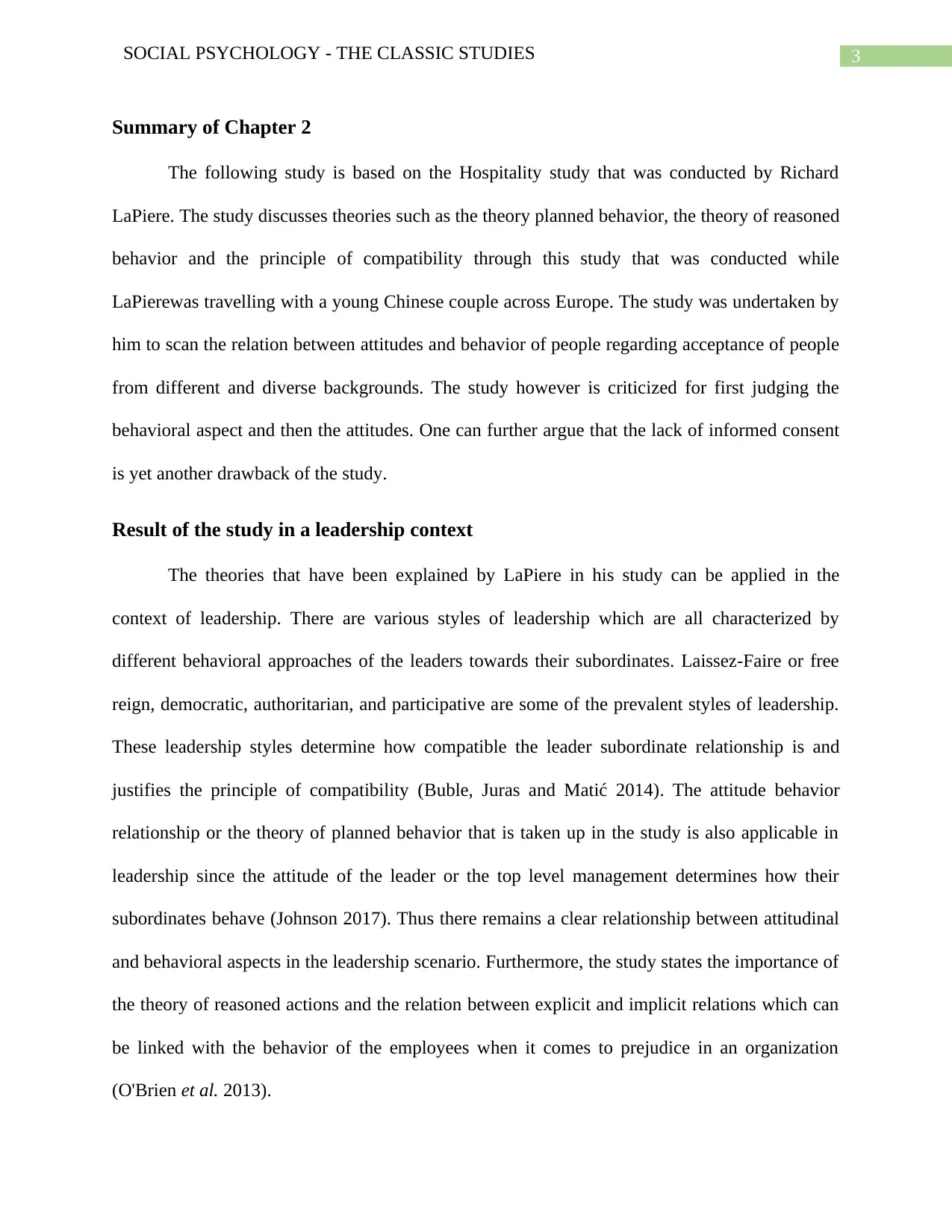
3SOCIAL PSYCHOLOGY - THE CLASSIC STUDIES
Summary of Chapter 2
The following study is based on the Hospitality study that was conducted by Richard
LaPiere. The study discusses theories such as the theory planned behavior, the theory of reasoned
behavior and the principle of compatibility through this study that was conducted while
LaPierewas travelling with a young Chinese couple across Europe. The study was undertaken by
him to scan the relation between attitudes and behavior of people regarding acceptance of people
from different and diverse backgrounds. The study however is criticized for first judging the
behavioral aspect and then the attitudes. One can further argue that the lack of informed consent
is yet another drawback of the study.
Result of the study in a leadership context
The theories that have been explained by LaPiere in his study can be applied in the
context of leadership. There are various styles of leadership which are all characterized by
different behavioral approaches of the leaders towards their subordinates. Laissez-Faire or free
reign, democratic, authoritarian, and participative are some of the prevalent styles of leadership.
These leadership styles determine how compatible the leader subordinate relationship is and
justifies the principle of compatibility (Buble, Juras and Matić 2014). The attitude behavior
relationship or the theory of planned behavior that is taken up in the study is also applicable in
leadership since the attitude of the leader or the top level management determines how their
subordinates behave (Johnson 2017). Thus there remains a clear relationship between attitudinal
and behavioral aspects in the leadership scenario. Furthermore, the study states the importance of
the theory of reasoned actions and the relation between explicit and implicit relations which can
be linked with the behavior of the employees when it comes to prejudice in an organization
(O'Brien et al. 2013).
Summary of Chapter 2
The following study is based on the Hospitality study that was conducted by Richard
LaPiere. The study discusses theories such as the theory planned behavior, the theory of reasoned
behavior and the principle of compatibility through this study that was conducted while
LaPierewas travelling with a young Chinese couple across Europe. The study was undertaken by
him to scan the relation between attitudes and behavior of people regarding acceptance of people
from different and diverse backgrounds. The study however is criticized for first judging the
behavioral aspect and then the attitudes. One can further argue that the lack of informed consent
is yet another drawback of the study.
Result of the study in a leadership context
The theories that have been explained by LaPiere in his study can be applied in the
context of leadership. There are various styles of leadership which are all characterized by
different behavioral approaches of the leaders towards their subordinates. Laissez-Faire or free
reign, democratic, authoritarian, and participative are some of the prevalent styles of leadership.
These leadership styles determine how compatible the leader subordinate relationship is and
justifies the principle of compatibility (Buble, Juras and Matić 2014). The attitude behavior
relationship or the theory of planned behavior that is taken up in the study is also applicable in
leadership since the attitude of the leader or the top level management determines how their
subordinates behave (Johnson 2017). Thus there remains a clear relationship between attitudinal
and behavioral aspects in the leadership scenario. Furthermore, the study states the importance of
the theory of reasoned actions and the relation between explicit and implicit relations which can
be linked with the behavior of the employees when it comes to prejudice in an organization
(O'Brien et al. 2013).
Paraphrase This Document
Need a fresh take? Get an instant paraphrase of this document with our AI Paraphraser
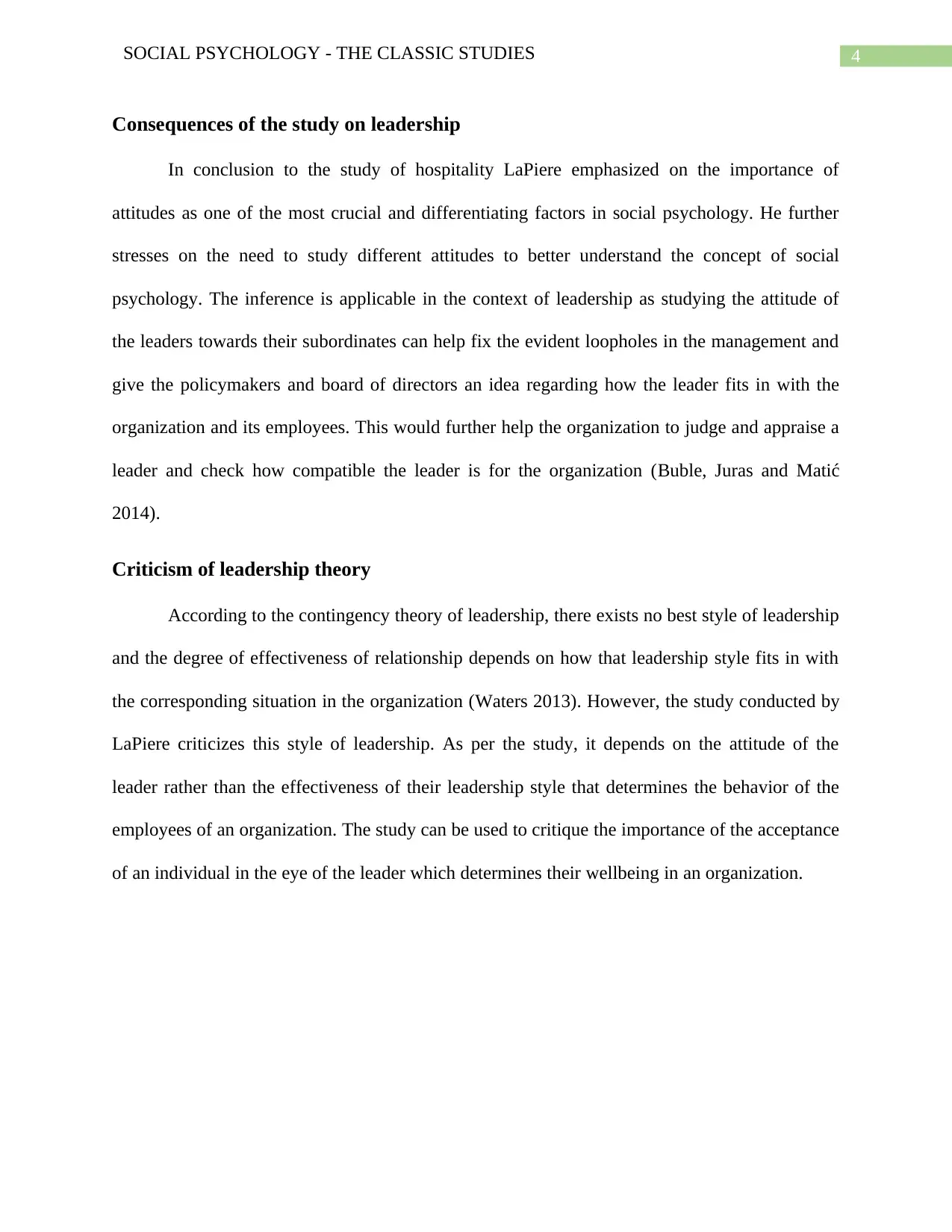
4SOCIAL PSYCHOLOGY - THE CLASSIC STUDIES
Consequences of the study on leadership
In conclusion to the study of hospitality LaPiere emphasized on the importance of
attitudes as one of the most crucial and differentiating factors in social psychology. He further
stresses on the need to study different attitudes to better understand the concept of social
psychology. The inference is applicable in the context of leadership as studying the attitude of
the leaders towards their subordinates can help fix the evident loopholes in the management and
give the policymakers and board of directors an idea regarding how the leader fits in with the
organization and its employees. This would further help the organization to judge and appraise a
leader and check how compatible the leader is for the organization (Buble, Juras and Matić
2014).
Criticism of leadership theory
According to the contingency theory of leadership, there exists no best style of leadership
and the degree of effectiveness of relationship depends on how that leadership style fits in with
the corresponding situation in the organization (Waters 2013). However, the study conducted by
LaPiere criticizes this style of leadership. As per the study, it depends on the attitude of the
leader rather than the effectiveness of their leadership style that determines the behavior of the
employees of an organization. The study can be used to critique the importance of the acceptance
of an individual in the eye of the leader which determines their wellbeing in an organization.
Consequences of the study on leadership
In conclusion to the study of hospitality LaPiere emphasized on the importance of
attitudes as one of the most crucial and differentiating factors in social psychology. He further
stresses on the need to study different attitudes to better understand the concept of social
psychology. The inference is applicable in the context of leadership as studying the attitude of
the leaders towards their subordinates can help fix the evident loopholes in the management and
give the policymakers and board of directors an idea regarding how the leader fits in with the
organization and its employees. This would further help the organization to judge and appraise a
leader and check how compatible the leader is for the organization (Buble, Juras and Matić
2014).
Criticism of leadership theory
According to the contingency theory of leadership, there exists no best style of leadership
and the degree of effectiveness of relationship depends on how that leadership style fits in with
the corresponding situation in the organization (Waters 2013). However, the study conducted by
LaPiere criticizes this style of leadership. As per the study, it depends on the attitude of the
leader rather than the effectiveness of their leadership style that determines the behavior of the
employees of an organization. The study can be used to critique the importance of the acceptance
of an individual in the eye of the leader which determines their wellbeing in an organization.
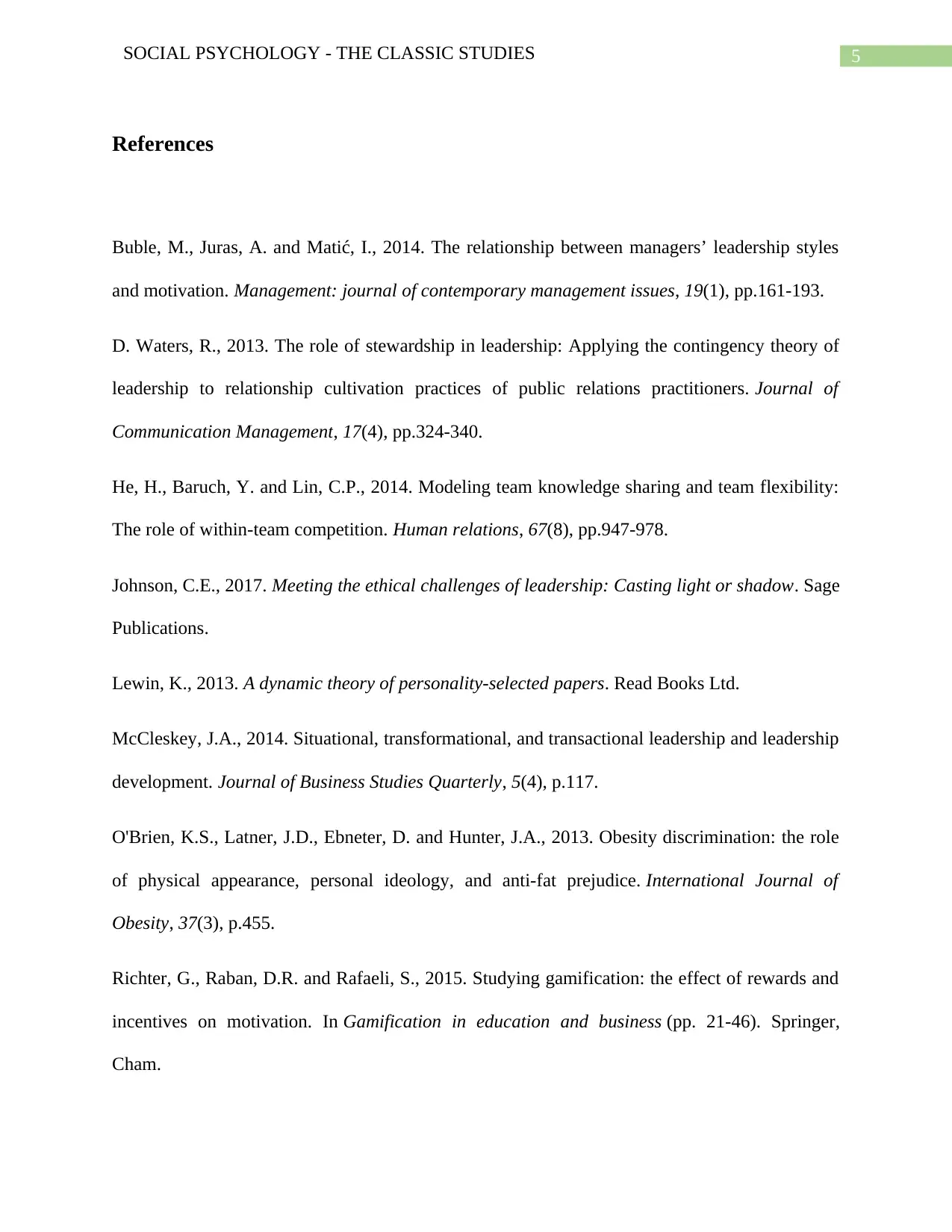
5SOCIAL PSYCHOLOGY - THE CLASSIC STUDIES
References
Buble, M., Juras, A. and Matić, I., 2014. The relationship between managers’ leadership styles
and motivation. Management: journal of contemporary management issues, 19(1), pp.161-193.
D. Waters, R., 2013. The role of stewardship in leadership: Applying the contingency theory of
leadership to relationship cultivation practices of public relations practitioners. Journal of
Communication Management, 17(4), pp.324-340.
He, H., Baruch, Y. and Lin, C.P., 2014. Modeling team knowledge sharing and team flexibility:
The role of within-team competition. Human relations, 67(8), pp.947-978.
Johnson, C.E., 2017. Meeting the ethical challenges of leadership: Casting light or shadow. Sage
Publications.
Lewin, K., 2013. A dynamic theory of personality-selected papers. Read Books Ltd.
McCleskey, J.A., 2014. Situational, transformational, and transactional leadership and leadership
development. Journal of Business Studies Quarterly, 5(4), p.117.
O'Brien, K.S., Latner, J.D., Ebneter, D. and Hunter, J.A., 2013. Obesity discrimination: the role
of physical appearance, personal ideology, and anti-fat prejudice. International Journal of
Obesity, 37(3), p.455.
Richter, G., Raban, D.R. and Rafaeli, S., 2015. Studying gamification: the effect of rewards and
incentives on motivation. In Gamification in education and business (pp. 21-46). Springer,
Cham.
References
Buble, M., Juras, A. and Matić, I., 2014. The relationship between managers’ leadership styles
and motivation. Management: journal of contemporary management issues, 19(1), pp.161-193.
D. Waters, R., 2013. The role of stewardship in leadership: Applying the contingency theory of
leadership to relationship cultivation practices of public relations practitioners. Journal of
Communication Management, 17(4), pp.324-340.
He, H., Baruch, Y. and Lin, C.P., 2014. Modeling team knowledge sharing and team flexibility:
The role of within-team competition. Human relations, 67(8), pp.947-978.
Johnson, C.E., 2017. Meeting the ethical challenges of leadership: Casting light or shadow. Sage
Publications.
Lewin, K., 2013. A dynamic theory of personality-selected papers. Read Books Ltd.
McCleskey, J.A., 2014. Situational, transformational, and transactional leadership and leadership
development. Journal of Business Studies Quarterly, 5(4), p.117.
O'Brien, K.S., Latner, J.D., Ebneter, D. and Hunter, J.A., 2013. Obesity discrimination: the role
of physical appearance, personal ideology, and anti-fat prejudice. International Journal of
Obesity, 37(3), p.455.
Richter, G., Raban, D.R. and Rafaeli, S., 2015. Studying gamification: the effect of rewards and
incentives on motivation. In Gamification in education and business (pp. 21-46). Springer,
Cham.
⊘ This is a preview!⊘
Do you want full access?
Subscribe today to unlock all pages.

Trusted by 1+ million students worldwide

6SOCIAL PSYCHOLOGY - THE CLASSIC STUDIES
1 out of 7
Related Documents
Your All-in-One AI-Powered Toolkit for Academic Success.
+13062052269
info@desklib.com
Available 24*7 on WhatsApp / Email
![[object Object]](/_next/static/media/star-bottom.7253800d.svg)
Unlock your academic potential
Copyright © 2020–2026 A2Z Services. All Rights Reserved. Developed and managed by ZUCOL.





